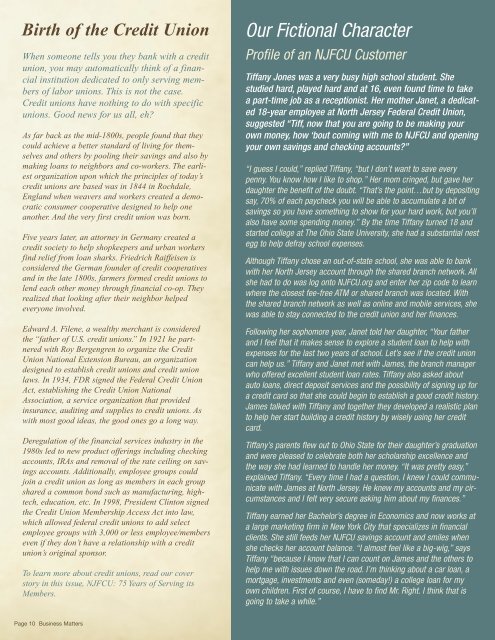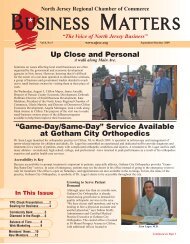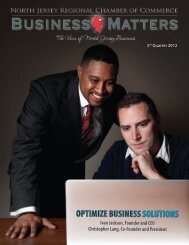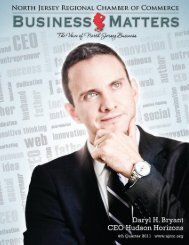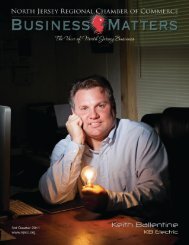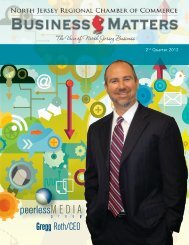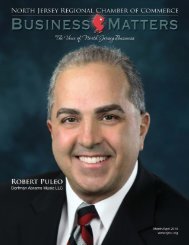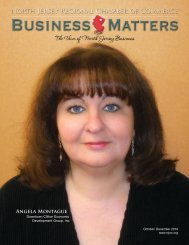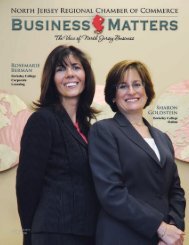taking membership
Business Matters - North Jersey Regional Chamber of Commerce
Business Matters - North Jersey Regional Chamber of Commerce
- No tags were found...
Create successful ePaper yourself
Turn your PDF publications into a flip-book with our unique Google optimized e-Paper software.
Birth of the Credit Union<br />
When someone tells you they bank with a credit<br />
union, you may automatically think of a financial<br />
institution dedicated to only serving members<br />
of labor unions. This is not the case.<br />
Credit unions have nothing to do with specific<br />
unions. Good news for us all, eh?<br />
As far back as the mid-1800s, people found that they<br />
could achieve a better standard of living for themselves<br />
and others by pooling their savings and also by<br />
making loans to neighbors and co-workers. The earliest<br />
organization upon which the principles of today’s<br />
credit unions are based was in 1844 in Rochdale,<br />
England when weavers and workers created a democratic<br />
consumer cooperative designed to help one<br />
another. And the very first credit union was born.<br />
Five years later, an attorney in Germany created a<br />
credit society to help shopkeepers and urban workers<br />
find relief from loan sharks. Friedrich Raiffeisen is<br />
considered the German founder of credit cooperatives<br />
and in the late 1800s, farmers formed credit unions to<br />
lend each other money through financial co-op. They<br />
realized that looking after their neighbor helped<br />
everyone involved.<br />
Edward A. Filene, a wealthy merchant is considered<br />
the “father of U.S. credit unions.” In 1921 he partnered<br />
with Roy Bergengren to organize the Credit<br />
Union National Extension Bureau, an organization<br />
designed to establish credit unions and credit union<br />
laws. In 1934, FDR signed the Federal Credit Union<br />
Act, establishing the Credit Union National<br />
Association, a service organization that provided<br />
insurance, auditing and supplies to credit unions. As<br />
with most good ideas, the good ones go a long way.<br />
Deregulation of the financial services industry in the<br />
1980s led to new product offerings including checking<br />
accounts, IRAs and removal of the rate ceiling on savings<br />
accounts. Additionally, employee groups could<br />
join a credit union as long as members in each group<br />
shared a common bond such as manufacturing, hightech,<br />
education, etc. In 1998, President Clinton signed<br />
the Credit Union Membership Access Act into law,<br />
which allowed federal credit unions to add select<br />
employee groups with 3,000 or less employee/members<br />
even if they don’t have a relationship with a credit<br />
union’s original sponsor.<br />
To learn more about credit unions, read our cover<br />
story in this issue, NJFCU: 75 Years of Serving its<br />
Members.<br />
Our Fictional Character<br />
Profile of an NJFCU Customer<br />
Tiffany Jones was a very busy high school student. She<br />
studied hard, played hard and at 16, even found time to take<br />
a part-time job as a receptionist. Her mother Janet, a dedicated<br />
18-year employee at North Jersey Federal Credit Union,<br />
suggested “Tiff, now that you are going to be making your<br />
own money, how ‘bout coming with me to NJFCU and opening<br />
your own savings and checking accounts?”<br />
“I guess I could,” replied Tiffany, “but I don’t want to save every<br />
penny. You know how I like to shop.” Her mom cringed, but gave her<br />
daughter the benefit of the doubt. “That’s the point…but by depositing<br />
say, 70% of each paycheck you will be able to accumulate a bit of<br />
savings so you have something to show for your hard work, but you’ll<br />
also have some spending money.” By the time Tiffany turned 18 and<br />
started college at The Ohio State University, she had a substantial nest<br />
egg to help defray school expenses.<br />
Although Tiffany chose an out-of-state school, she was able to bank<br />
with her North Jersey account through the shared branch network. All<br />
she had to do was log onto NJFCU.org and enter her zip code to learn<br />
where the closest fee-free ATM or shared branch was located. With<br />
the shared branch network as well as online and mobile services, she<br />
was able to stay connected to the credit union and her finances.<br />
Following her sophomore year, Janet told her daughter, “Your father<br />
and I feel that it makes sense to explore a student loan to help with<br />
expenses for the last two years of school. Let’s see if the credit union<br />
can help us.” Tiffany and Janet met with James, the branch manager<br />
who offered excellent student loan rates. Tiffany also asked about<br />
auto loans, direct deposit services and the possibility of signing up for<br />
a credit card so that she could begin to establish a good credit history.<br />
James talked with Tiffany and together they developed a realistic plan<br />
to help her start building a credit history by wisely using her credit<br />
card.<br />
Tiffany’s parents flew out to Ohio State for their daughter’s graduation<br />
and were pleased to celebrate both her scholarship excellence and<br />
the way she had learned to handle her money. “It was pretty easy,”<br />
explained Tiffany. “Every time I had a question, I knew I could communicate<br />
with James at North Jersey. He knew my accounts and my circumstances<br />
and I felt very secure asking him about my finances.”<br />
Tiffany earned her Bachelor’s degree in Economics and now works at<br />
a large marketing firm in New York City that specializes in financial<br />
clients. She still feeds her NJFCU savings account and smiles when<br />
she checks her account balance. “I almost feel like a big-wig,” says<br />
Tiffany “because I know that I can count on James and the others to<br />
help me with issues down the road. I’m thinking about a car loan, a<br />
mortgage, investments and even (someday!) a college loan for my<br />
own children. First of course, I have to find Mr. Right. I think that is<br />
going to take a while.”<br />
Page 10 Business Matters


